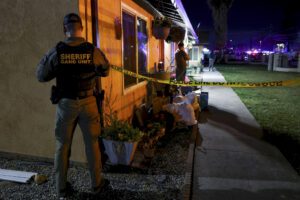Inside the team pioneering California’s red flag law

There were four more requests for gun violence restraining orders on Jeff Brooker’s desk when he arrived at the San Diego City Attorney’s Office that July morning.
Officers had responded to a minor car crash at a mall where the driver, who carried a replica firearm, was rambling delusionally and threatening to kill the “one-percenters” and a public official. Another man, during an argument outside a family member’s home, had pulled a gun out of his waistband and pointed it at someone’s head as several others looked on.
It was not an unusual number of new cases for the department’s eight-member gun violence restraining order unit, which Brooker oversees. In an average week, they triage 30 referrals from local police, reviewing scenarios in which officers believe a resident is at risk of committing gun violence.
About a third of the time — in those instances when the person clearly poses a danger to themselves or others, and they aren’t already prohibited from possessing weapons for another reason — the office will petition a judge to temporarily seize their firearms, under a six-year-old California statute that was among the country’s first “red flag” laws.
More than 1,250 times since the end of 2017, when San Diego City Attorney Mara Elliott launched the pioneering unit, Brooker’s team has successfully filed a gun violence restraining order, leading to the seizure, as of April, of nearly 1,600 firearms from 865 people — far more than any other agency in the state. An estimated one-third of the weapons, most of which are handguns, have since been returned to the owners.
“Do you believe this person should have a gun? Your own sense is the best test,” said Brooker, who employs a cable television thought experiment to illustrate how he tries to depoliticize the highly charged red flag law: If a case hypothetically turns into a major news story, how might it be covered by both liberal MSNBC host Rachel Maddow and conservative Fox News anchor Sean Hannity?
“If this is a case they can agree on, this is the kind of case we’re going to file,” Brooker said. Read more >>>